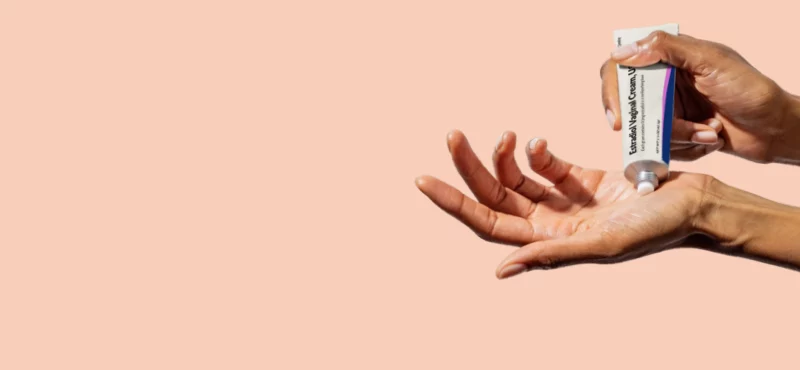Questions like, “Is vulvar itching common during menopause?” and “How long does menopause vaginal itching last?” and “Can menopause cause clitoris itching?” are common Google searches for a good reason: this common sexual health condition is chronic, progressive, under-diagnosed, and not discussed by most doctors.
In this article, we’ll cover the signs and symptoms of vaginal itching (spoiler alert, it’s very common for women in their 50s and beyond!), talking about the ways that menopause causes changes to the entire vulva - according to clinical studies - in addition to some strategies on how to treat an itchy vulva or vagina.
Tips for knowing your body: The vagina is a part of the vulva. We often refer to the vagina when in fact we mean the vulva which is the entire area that encompasses the vagina, clitoris, labia, and urethra.
Why is it so itchy down there?
The relationship between menopause itchiness and vaginal atrophy
Vaginal atrophy is a gynecological condition that affects between 40% to 57% of American women. It is also known as vulvar atrophy, vulvovaginal atrophy, or the genitourinary syndrome of menopause.
Vaginal atrophy is characterized by declining levels of estrogen, especially in menopause. When these changes occur, it can result in dryness, burning, itching, painful sex, vaginal bleeding - and with time - worsening discomfort and severe pain in the entire vulva.
According to a survey of women’s attitudes and experiences with vaginal changes due to menopause, vaginal itching and irritation are commonly reported along with other symptoms:
- 55% report vaginal dryness
- 44% report pain during sex
- 37% report vaginal irritation
- 17% report vaginal tenderness
- 8% report bleeding during intercourse
- 2% report pain during exercise
These self-reported experiences align with the research. According to research, a sharp decline in estrogen levels during menopause causes a decrease in vaginal blood flow and a decrease in vaginal lubrication.
For some women, this can lead to discomfort that interferes with everything from sleeping, traveling, athletic activities, and enjoyment of life in general.
And while vaginal itchiness from menopause is totally natural, it doesn’t have to be your new normal. A 2008 study showed that these changes from vaginal atrophy can be reversed by the use of estrogens, and there are other strategies for dealing with menopausal vaginal itching that we’ll cover here in this article.
How common is vaginal atrophy?
Many women with vaginal itchiness wonder what are the risk factors for vaginal atrophy, and unfortunately, any woman can develop atrophy.
Numerous studies have evaluated the prevalence of vaginal atrophy. Due to declining levels of estrogen, it’s most common for women who are post-menopausal, but it can also develop in:
- Those who are in perimenopause
- Women who have a history of breast cancer
- Women who are taking medications that inhibit estrogen
4% of early perimenopausal women and 47% of late post-menopausal women reported symptoms. While these studies varied in design, they can provide a good estimate of how common vaginal atrophy is.
Signs of itching that could lead to atrophy
Vaginal itching is a sign of vaginal atrophy and it can be accompanied by a constellation of symptoms that, if left untreated, will lead to further atrophy and discomfort. Common signs of vaginal atrophy can include:
- Pruritis or itchiness in the vagina or vulva
-
- Thinning of the skin may cause an uncomfortable, irritating sensation that makes you want to scratch. This can include itchiness on the skin in the vagina, vulva, clitoris, and labia.
- Lack of lubrication
-
- For women who are sexually active, pain with intercourse is the first symptom that’s usually noticed and this could be due to lack of lubrication.
- Persistent vaginal dryness
-
- Eventually, persistent vaginal dryness may occur that does not go away even with moisturizers or lubricants.
- Soreness or stinging pain in the vaginal or vulvar area
- Thin yellow or grey discharge
-
- This is attributed to the rise in vaginal pH that accompanies vaginal atrophy
- Urinary urgency, frequency, and waking up at night to pee
As you can see, vaginal itchiness can be accompanied by many other symptoms of vaginal atrophy, and it’s best to address itchiness before it gets worse.
Getting help for vaginal itchiness
If you’ve hesitated to get help for vaginal itching, well, join the club! Studies have shown that women do not always report their symptoms of vaginal atrophy to a doctor - and they are less likely to report symptoms like itching than say, discharge. Those who do not get help do so for a variety of reasons and include:
- Those who are self-treating
- Women who feel their symptoms aren’t important enough
- Women who feel embarrassed
If you’re feeling embarrassed, you can take comfort that what you’re experiencing is a totally normal part of getting older and that you’re not alone. And if the itchiness doesn’t feel important enough now, it may still be something to address sooner rather than later.
Getting help is a matter of speaking with a qualified medical professional who can help you understand your options and choose a treatment that works for you. We’ll cover some strategies below.
How to treat vaginal itchiness and atrophy
When it comes to treating persistent and bothersome vaginal itchiness due to vaginal atrophy in menopause, there are a few options you can consider:
- Vaginal moisturizer
-
- This can include creams or lotions that are applied to the entire vulva, but generally, these treatments will not target the root cause of symptoms.
- This can also include vaginal suppositories that are inserted into the vagina which also work to relieve itchiness temporarily.
- Vaginal estrogen prescription
-
- Backed by decades of clinical studies, vaginal estrogen is FDA-approved for treating moderate to severe itchiness and dryness. It is prescribed as a cream, suppository, or ring. This low-dose medication is applied directly to the vagina, and as such, is not shown to carry any serious health risks.
- Hormone therapy prescription
-
- This can include estrogen-only or estrogen-and-progesterone preparations - depending on if you’ve had a hysterectomy. Hormone therapy is commonly prescribed for menopause symptoms including vaginal dryness, but it carries serious health risks, so a qualified medical professional assesses the benefits and risks for each patient.
Unfortunately, vaginal itchiness from menopause will get worse if not treated, and vaginal moisturizers will not treat the root cause of symptoms; instead, physicians and specialists rely on the above prescription treatment options to promote long-term vaginal comfort and health.
If you're ready to get help today, start with Interlude. We offer vaginal estrogen, prescribed by an MD or GYN after an easy online visit. You'll answer a series of questions about your health history, preferences, and goals, and a provider will review your information and offer a prescription and custom care plan. If prescribed, your cream will arrive in 3-5 business days — and for a limited time you can get off your first shipment.



